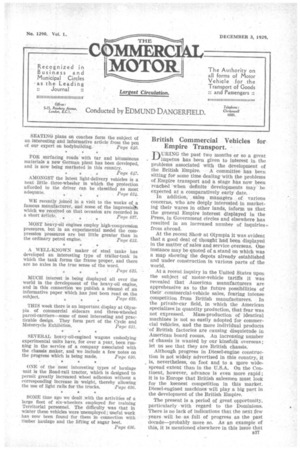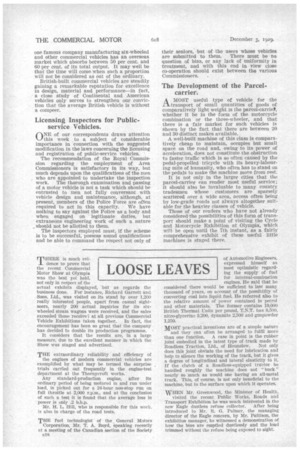British Commercial Vehicles for Empire Transport.
Page 43

Page 44

If you've noticed an error in this article please click here to report it so we can fix it.
TWRING the past two months or so a great -I--fimpetus has been given to interest in the problems associated with the development of the British Empire. A committee has been sitting for some time dealing with the problems of Empire transport and a stage has now been reached when definite developments may be expected at a comparatively early date.
• In addition, , sales , managers of various concerns, who are deeply interested in marketing their wares hi other lands, inform us that the general Empire interest displayed in the Press, in Government circles and elsewhere has resulted in an increased number of inquiries,. from abroad.
At the recent ShoW at Olympia it was evident that a good deal of thought had been displayed in the matter of sales and service overseas. One instance may be quoted of a stand on which was a map showing the depots already established and under construction in various parts of the world.
At -a recent inquiry in the United States upon the subject of motor-vehicle tariffs it was revealed that American manufacturers are apprehensive as to the future possibilities of their" commercial-vehicle sales, fearing intense competition from British manufacturers. In the private-ear field, in which the American specializes in quantity production, that fear was not expressed. Mass-production of identical machines is not so easily adopted for commercial vehicles, and the more individual products of British factories are causing disquietude in American board rooms. An increasing number of chassis is wanted by our kinsfolk overseas ; let us see that they are British chassis.
Although progress in Diesel-engine construction is not widely advertised in this country, it . is, nevertheless, on foot and to a more widespread extent than in the U.S.A. On the Continent, however, advance is even more rapid ; it is to Europe that British salesmen must look for the keenest competition in this market. Diesel-engined machines will play a big part in the development of the British Empire.
The present is a period of great opportunity, particularly with regard to the Dominions. There is no lack of indications that the next few years will be as full of progress as the past decade—probably, more so. As an example of this, it is mentioned elsewhere in this issue that one famous company manufacturing six-wheeled and other commercial vehicles has an overseas market which absorbs between 50 per cent. and 60 per cent. of its total output. It may well be that the time will come when such a proportion will not be considered as out of the ordinary.
British-built commercial vehicles are steadily gaining a remarkable reputation for excellence in design, material and performance—in fact, a close study of Continental and American vehicles only serves to strengthen our conviction that the average British vehicle is without a compeer.
Licensing Inspectors for Publicservice Vehicles.
ONE of our correspondents draws attention this weeka subject of considerable importance in connection with the suggested modification in the laws concerning the licensing and registration of public-service vehicles.
The recommendation of the Royal Commission regarding the employment of Area Commissioners is satisfactory in its way, but much depends upon the qualifications of the men who are appointed to undertake the inspection work. The thorough examination and passing of a motor vehicle is not a task which should be entrusted to men not fully conversant with vehicle design and maintenance, although, at present, members of the Police Force are often required to act in this capacity. We have nothing to say against the Police as a body and when engaged on legitimate duties, but extraneous engineering work of such a nature should not be allotted to them.
The inspectors employed must, if the scheme is to be successful, possess sound qualifications and be able to command the respect not only of their seniors, but of the users whose vehicles are submitted to them. There must be no question of bias, or any lack of uniformity in treatment, and with this end in view close co-operation should exist between the various Commissioners. .
The Development of the Parcelcarrier.
A MOST useful type of vehicle for the 11.transport of small quantities of goods of comparatively light weight is the parcel-carries, whether it be in the form of the motorcycle combination or the three-wheeler, and that there is a fair market for such vehicles is shown by the fact that there are between 20 and 30 distinct makes available.
A well-built machine of this class is comparatively cheap to maintain, occupies but small space on the road and, owing to its power of acceleration, does not constitute the obstruction to faster traffic which is so often caused by the pedal-propelled tricycle with its heavy-labouring mite of humanity, who often has to stand on the pedals to make the machine more from rest.
It is not only in the larger cities that the parcel-carrier can render most useful service ; it should also be invaluable to many country tradesmen whose customers are sparsely scattered over a wide area, access often being by low-grade roads not always altogether suitable for the heavier classes of vehicle.
Those of our readers who have not already considered the possibilities of this form of transport should make a point of visiting the Cycle and Motorcycle Exhibition at Olympia, which will be open until the 7th instant, as a fairly comprehensive exhibit of these useful little machines is staged there.




















































































































